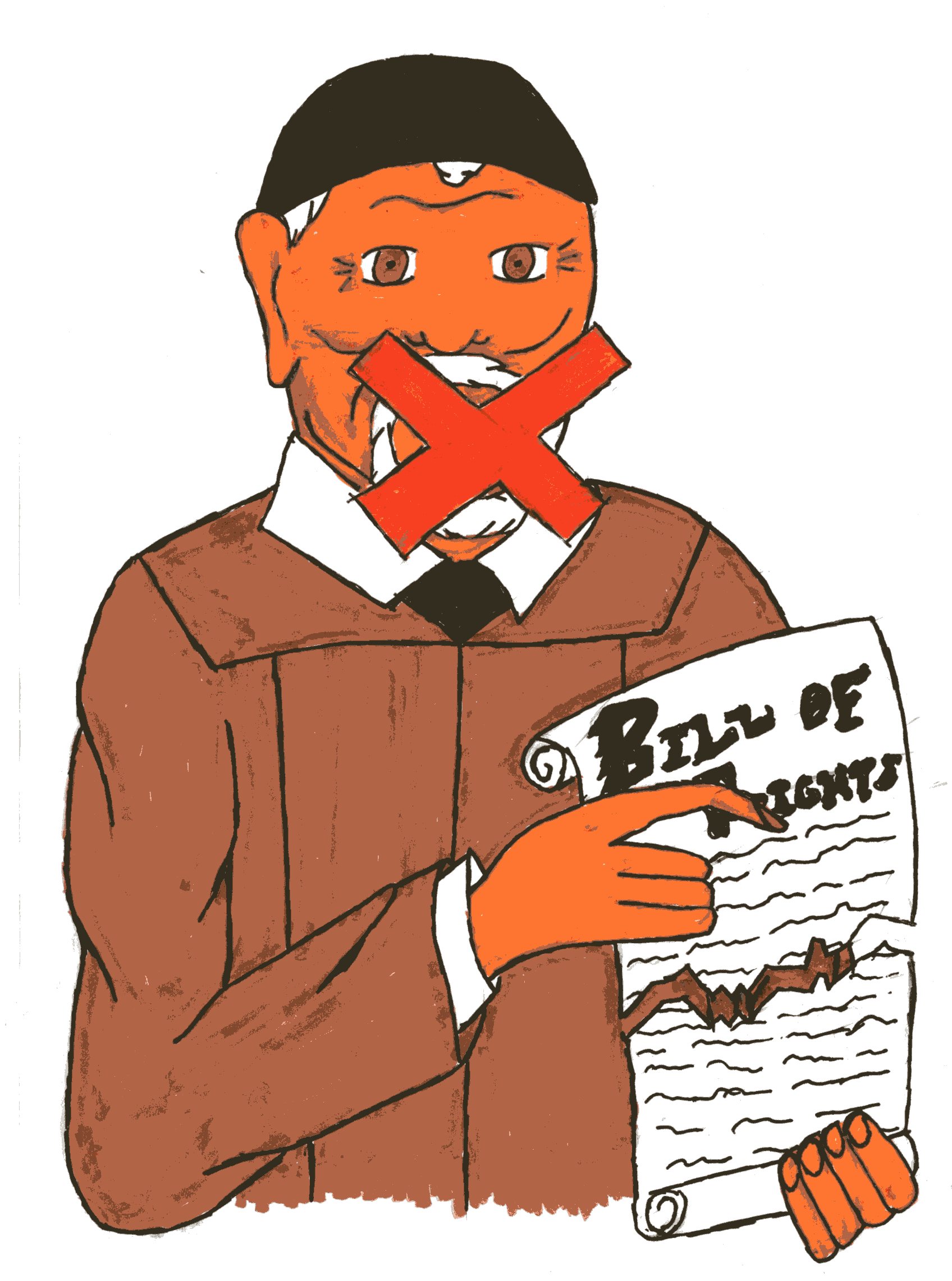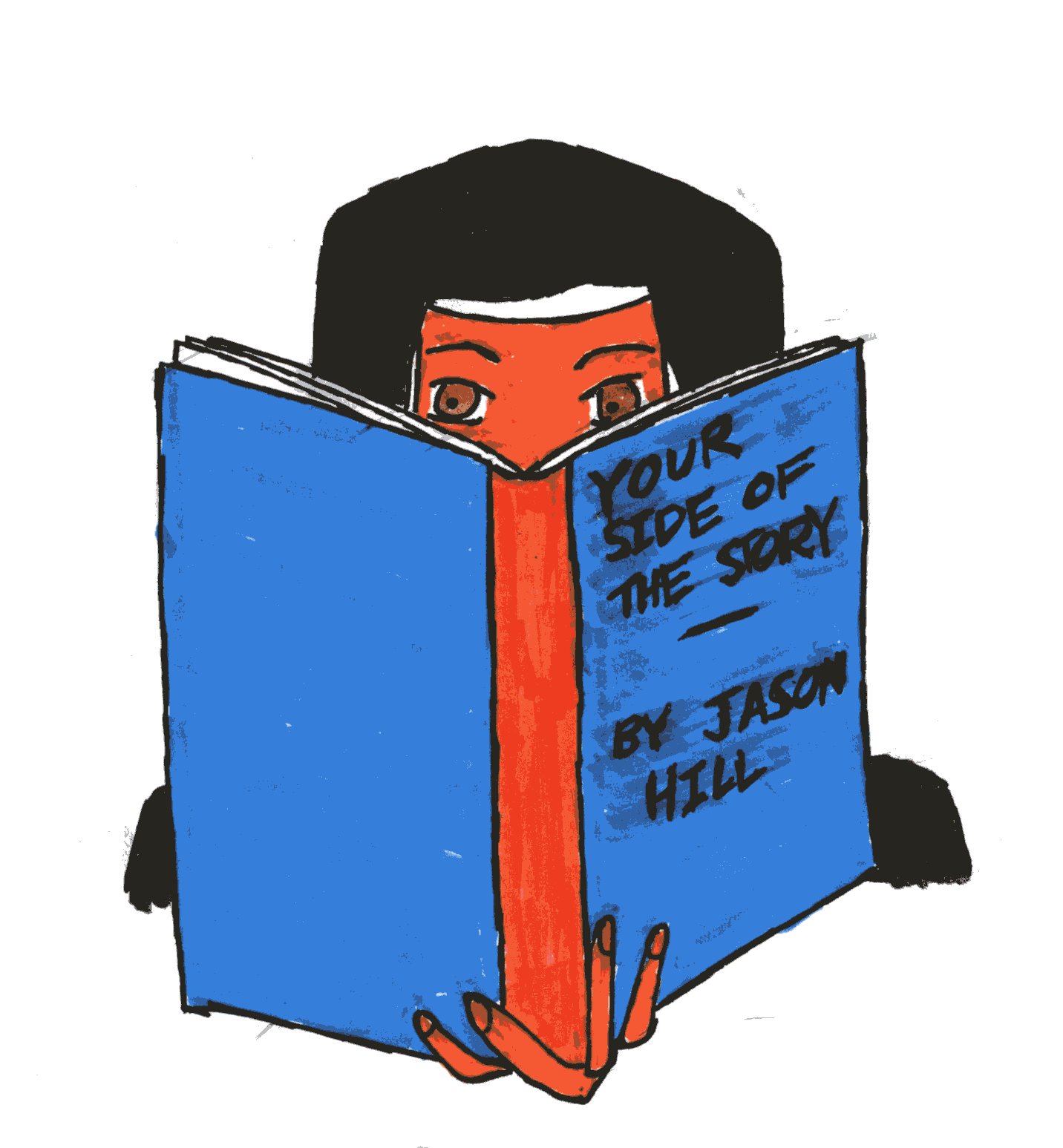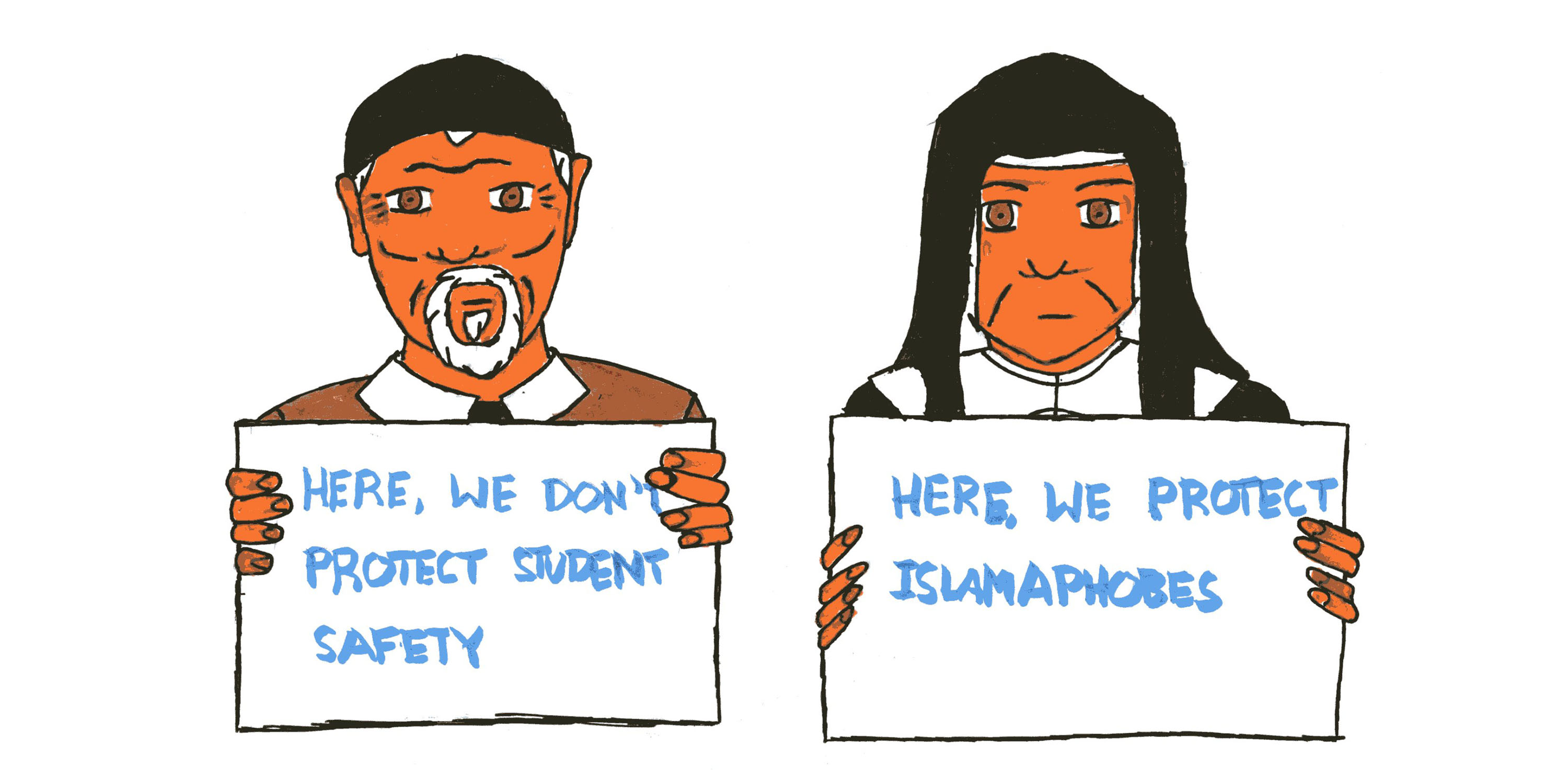Under the chill, clouded air of a Wednesday afternoon sky, a crowd of DePaul students assembled around the pergola outside Arts & Letters Hall.
Eight days prior, an email from President Gabriel Esteban was sent out to the entire campus.
The email was an assertion of DePaul’s commitment to promoting academic freedom and expression.
“Our professors and students share academic freedom, guaranteed to them by their membership in the university community,” the email said. “They also share freedom of speech, guaranteed to them by the Bill of Rights. DePaul will ensure that all faculty and students are empowered to exercise these rights, and DePaul will provide an appropriate environment where ideas can be exchanged freely in an atmosphere of safety for all.”
Esteban’s statement came a week after Jason Hill, a philosophy professor at DePaul, published an op-ed piece in The Federalist. The piece was a plea that Israeli Prime Minister Benjamin Netanyahu would follow through with his campaign promise to annex Jewish settlements in areas of the country under Palestinian control.
Hill, in his article, said that Palestinians had no legal right to be in Israel because “morally speaking, after the 1967 war, they never belonged there.” He also said that they have no cultural right to be in Israel.
“Jewish civilization is an international treasure trove that must be protected,” Hill said. “Not all cultures are indeed equal. Some are abysmally inferior and regressive based on their comprehensive philosophy and fundamental principles — or lack thereof — that guide or fail to protect the inalienable rights of their citizens.”
Esteban’s statements were written to support Hill’s right to make and publish his stance. However, Esteban was careful to mention that Hill’s views did not reflect DePaul’s in any way.
But, despite buzzwords and phrases such as “Vincentian personalism” and “academic freedom” and the separation of DePaul from Hill’s story, Esteban’s response failed to appease the sector of the student body wounded by Hill’s words. Those wounded felt that separating DePaul from the article was not enough. DePaul must outright decry and condemn Hill’s toxic beliefs, not stow them behind a statement of academic freedom.
Thus, the student body stood gathered outside Arts & Letters Hall on the afternoon of Wednesday, May 2, in hopes of drawing a stronger response from the university regarding Hill.
While every person there had their own personal reasons for lifting their voices and becoming a part of the movement speaking out against Hill, one central theme persisted: the question of the extent of free speech on DePaul’s campus.
This theme is nothing new to DePaul. It echoes Milo Yiannopoulos’ fiery 2016 appearance cut short by the mobilized student outcry against Yiannopoulos’ far-right views. It is a present-day retelling of Professor Thomas Klocek’s 2004 comments to DePaul’s Social Justice for Palestine organization that “there is no such thing as a moderate Muslim.” The list goes on.
The events leading to the protest on May 2 were simply the latest entry into the saga of the great DePaulian question of free speech within the university and the repeated failure of the administration to address issues of free speech in ways pleasing to the full student body.
Crafting a resolution to the diverse list of desired outcomes from every student and organization affected by free speech at a university as large as DePaul is a challenge. However, it is not impossible and begins with DePaul opening its ears to students. Time and time again, major stakeholders in issues of free speech have cried out that the university has not given their sides enough consideration.
Who are these stakeholders? To focus on the Professor Hill installment of DePaul’s free speech saga, the protestors stood as major stakeholders. They represented a group of Palestinian and Muslim students and allies demonized by an authoritative figure within DePaul’s community. They were seeking a stronger response from the president to decry Hill to create a safer and more accepting campus.
However, they are not the only stakeholders worth noting in this installment. Others, such as Claire Kaczanowski, a sophomore at DePaul, were impacted by Hill and Esteban in ways that bring deeper implications and threats to light.

Illustration by Justin Myers, 14 East.
“I was shocked initially,” Kaczanowski said regarding her first reaction to Hill’s article. “And, then, you know, obviously angry, like everyone else.”
With the release of Esteban’s response, an additional feeling swept over her.
“I was like, ‘Oh, the hypocrisy,’” Kaczanowski said.
In his response, Esteban said that all DePaul professors and students are given the liberty to share their views and voices by DePaul University but also “share freedom of speech, guaranteed to them by the Bill of Rights.”
“Because of a lot of things that have been going on this year, it seems like the whole free speech Bill of Rights argument just isn’t valid,” Kaczanowski said.
This past February, she was fired from her student employee position within the Health Promotion and Wellness office. The reason she was given by DePaul for her termination: she exercised freedom of speech, confirmed through email conversations between Kaczanowski and her supervisor.
An active leader in DePaul’s student government, Kaczanowski ran a strong campaign to push DePaul to provide free STI testing for its student body. She was successful, but the demand was larger than expected during the first rounds of testing. DePaul’s supply of STI testing resources couldn’t meet that demand, forcing students to be turned away to find help elsewhere.
“When I was trying to refer students to Planned Parenthood to get testing if they needed it outside of DePaul, I was told I couldn’t do that,” Kaczanowski said.
However, Kaczanowski didn’t listen. Shortly after that encounter, she was interviewed by The DePaulia on the supply failure and what external STI testing resources were available to DePaul students. She listed Howard Brown, the Center on Halsted and Planned Parenthood.
“I was fired simply for dropping their name as a resource for STI testing,” Kaczanowski said. “The defense that they gave me is that I didn’t have freedom of speech at DePaul because it is a private institution so that I was insubordinate by not following those guidelines. Which is why, when I read Esteban’s letter, I was like, well, that’s ironic.”
It would be a double standard to say that Hill deserved to go without penalty while Kaczanowski deserved her punishment of termination. However, the question isn’t about who deserved to be punished. The question is about a university that responded to a free speech case aimed at educating students on available health resources with termination and an assertion that it is not a free speech institution amid a case sparking student outcries and protests that was met with an assertion of DePaul’s “belief” in the Bill of Rights and free speech.
However, the double standard of freedom given by DePaul to Hill contains an additional danger to students in the context of the Hill story, as Michael Adato, a sophomore at DePaul, would attest to.

Illustration by Justin Myers, 14 East.
Adato is a student leader within DePaul’s Jewish community. He asserted and made clear that his statements regarding Hill are personal and not reflective of those of any student organization at DePaul.
“I think the article was a terrible article,” Adato said regarding Hill’s article. “And, when I first saw it, I was kind of personally embarrassed because he’s not Jewish. And, my initial reaction was — and this came to be true — everyone’s going to think that all Jews agree with it. In reality, I couldn’t find a single Jew in this community who agrees with it.”
For Adato, Hill’s non-Jewish status was problematic in The Federalist article, in which Hill praised the “international treasure trove” and “exceptionalist nature of Jewish civilization.”
“There’s an element of philo-Semitism, that is this love of Jews, and almost a fetish for Israel and for Jews,” Adato said.
That “philo-Semitism” is what makes Hill’s representation of the Jewish population in Israel problematic for Adato. While unsure of the religious beliefs of Hill, Adato said that Hill’s statements draw parallels with philo-Semitism in Christianity. In Christianity, Adato gives the prophetic coming of the Messiah to Jerusalem in the Christian faith as an example.
“I think [the Messiah coming] leads some to support Israel, but not for the merits of our country or the merits of the Jewish people, but simply based on religious prophecy and using Jews as a tool for ideological purposes,” Adato said. “I worry that that’s where [Hill’s article] came from. But, to be quite honest, I really don’t know. Because I don’t know him.”
Adato also found Hill’s words on Zionism problematic.
“Zionism is an inherently Jewish idea, and he shouldn’t speak for the Jewish people,” Adato said. “Zionism is the national liberation movement of the Jewish people. It calls for self-determination of the Jewish people.”
Adato further explained that the misrepresentation of Zionism is an especially sensitive topic in the Jewish faith, as it encompasses many ideas and forms—many of which call for the coexistence of Palestinians and Jews in Israel.
“People think that Zionism is a dirty word,” Adato said. “And, I’ll be painted as somebody who hates Muslims or hates Palestinians because I’m a Zionist. That’s not true. I vehemently deny that.”
The stereotype that all Zionists do hate Muslims and Palestinians, reinforced by Hill’s article calling Palestinian culture “abysmally inferior and regressive,” is something that Adato says has led to problems.
“Jews on campus have to hide their identities because, otherwise, you’re going to be gained up on and intimidated and called all sorts of names and called Islamophobic, that we’re genocidal or, in any way, hateful,” Adato said. “I think that’s a real shame. And, it’s a concerning trend on this campus and campuses across the country.”
The misrepresentation by Hill, who was attributed as a professor at DePaul in the tagline of his article, pushed Adato into action.
“I knew immediately that I was going to have to try and be the one to say, ‘Oh, he doesn’t represent us. He’s not affiliated with us. We don’t know him,’” Adato said.
Adato called out Hill’s suggestion to kick out millions of Palestinians, saying that his beliefs aren’t even supported by the far-right sectors of the Jewish community.
“There’s a plethora of opinions ranging from left to right,” Adato said. “But, none of them are ‘Let’s just take everything we want. And, if people don’t like it, we’re just going to get rid of them.’ No one believes it.”
Regarding Adato’s overall reaction to Hill’s argument: “I don’t get the sense that he has any root in reality on this.”
Despite Hill’s disconnect from reality, Adato said that Hill has a right to free speech, which Adato supports and respects. However, it was Hill exercising his free speech to grossly misrepresent the Jewish community and Israel that led Adato to find fault. In his article, Hill made no distinctions that he was speaking only on behalf of a minority belief within Israel’s Jewish population and wrote of Israel’s Jewish population as a complete, cohesive unit with no disclaimer that his opinions were not widely shared. However, he could have easily spoken on behalf of any other minority group on campus, making Adato’s story important to the DePaul community at large.
In response to concerns from individuals such as Adato, Kaczanowski, and the protestors, DePaul has opened its ears.
Acting Provost Salma Ghanem has emerged as the leader of DePaul’s charge to ensure that student voices are being heard by the administration. Since the controversy, she has been an open and active listener and respondant to student concerns about the Hill controversy, taking part in student-inclusive forums and encouraging students to reach out to her to meet one-on-one to discuss worries and suggest change.
“We’re becoming a university where we are debating these issues,” Ghanem said during a May 21 meeting. “If it doesn’t happen on a campus, where will it happen?”
In support of her statement, Ghanem said that the university is working on an invitation to Erwin Chemerinsky, dean of the Law School at the University of California, Berkley, to speak about free speech in the Fall.
Ghanem said that Chemerinsky’s campus talk will advance the debate over free speech at DePaul in a healing and progressive direction.
“It’s a complex issue,” Ghanem said. “It’s not black and white.”
While she didn’t “know the details” regarding specific incidents such as Kaczanowski’s, Ghanem did give her views on the current state and future of free speech at DePaul as a whole.
“These issues are very complex, and we need to invite all voices to the discussion,” Ghanem said.
All in all, not even the most idealized resolution will lend a finite end to the DePaulian question of free speech. However, ensuring that stakeholders’ voices are heard by the university is key to ever reaching one through the establishment of discourse that calls out injustices, corrects misrepresentations and suggests constructive change to bring hope of better days for not just the current generation of DePaul students but for the future.
“When you put your ideas and your identity through fire, it comes out more refined and more nuanced on the other end,” Adato said regarding the expression of free speech amidst the troubling times of the Hill debate. “I think it’s worth it. I think when we face the fire, we end up stronger.”
Header illustration by Justin Myers, 14 East.




NO COMMENT